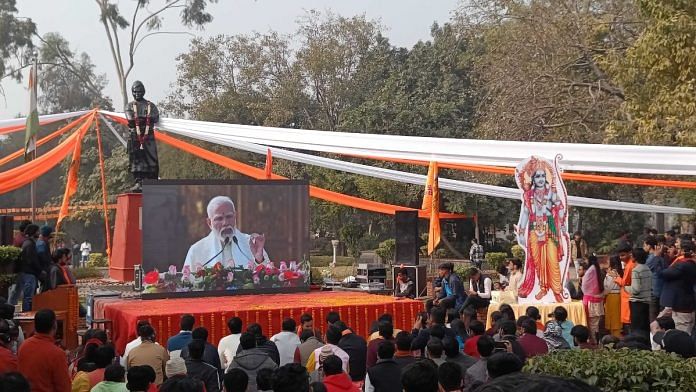Narendra Modi was the star of the show in Ayodhya. The temple to Ram, half-complete and still draped in a maze of scaffolding, was conscripted to serve the Prime Minister’s political timetable. And the charade he staged there exemplified the hollowness of its emcee. The inaugural act of a temple proclaimed as the inclusive emblem of a reincarnated India was to play host to a tightly policed spectacle open only to an ensemble of handpicked politicians, plutocrats, and celebrities. Modi’s New India did not extinguish old iniquities. It proudly paraded them. Ram was incidental to the ceremony supposed to herald his homecoming.
The Prime Minister, as always, was so preoccupied with choreographing the event that its aftermath did not occur to him. As soon as he and his worshippers departed, chaos ensued at the temple. A short distance from it were the remains of the properties peremptorily demolished to prettify the city. The people who lived and worked there complain that they were displaced without being recompensed. What happened in Ayodhya—spectacle cloaking misery—compressed India’s experience of the past decade into a single afternoon. It was not a celebration of civilisational resurgence. It was an exhibition of civilisational decay.
Hindu exceptionalism became extinct in Ayodhya. Adherents of Hinduism can no longer claim that their faith is inherently unsuited to theocratic machinations. Hinduism in the hands of Hindu nationalists is as much a political tool as Sikhism in the hands of the proponents of Khalistan and Buddhism in the hands of Sinhala supremacists.
This is a testing time for all who live by Indian pluralism. To retreat into despair, however, is to abet the project to decimate the radical promise of old India. But to persist, we must first shed the comforting delusions about the nature of the ideology that is consolidating itself into the default creed of the Indian state. Those who continue naively to seek solace in the belief that Hindutva will express itself in benign ways are hoping to delay a reckoning that will be all the more shattering when it finally happens. On the other hand, those who consider themselves secular in the Indian way and take pride in being implacably opposed to this government and its sectarian philosophy have work of their own to do.
The republic bequeathed by modern India’s founders—who, rejecting the malign logic of Partition, forged a democratic union out of continental diversity and made citizens of a people who had known only subjecthood for millennia—did not collapse from the blows of Hindu nationalists alone. It imploded from within.
Also read: Modi has defined new ‘political time’ at Ayodhya. It’ll reshape our future public culture
Modi’s New India
What passed for Indian secularism—an ideal panegyrised more than it was practised—could not survive the awakening of a sectarian political consciousness in the Hindu community. At critical moments, its custodians and advocates, oscillating between paternalism and purity tests, failed its intended beneficiaries by forsaking them rather than fighting on their behalf. It catches the breath to think that, until only four years ago, Muslim wives could be discarded like chattel by their husbands by the expedient trick of chanting the phrase talaq three times. It fell to a Hindu nationalist government, whatever its motive, to undo that farce and grant dignity in law to Muslim women. Secularism should be an instrument to achieve equal citizenship—not an amulet to absolve religious obscurantism.
This is a moment when opportunists of every stripe will rear their snouts. Secular Indians have a special obligation to be particularly vigilant against the petty purveyors of ethnoreligious nationalism—from the North to the South—who will attempt to use this crisis of identity to discredit Indian unity. To accede even theoretically to their demands to Balkanise India is to capitulate to the divisive rationale of Hindu nationalism.
Modi’s New India has not wholly negated everything from the past; it has retained the worst habits of old India—cronyism, cults of personality, corruption—and added to them sinister self-pity, murderous vigilantism, mob justice, institutional subversion, and a near-total control of the press. The months and years ahead will be intensely difficult. But, travelling through this country, I am not convinced that the Indian experiment is about to come to a crashing end. The most discernible political fact about India is the backlash brewing against this government. It is scattered and inchoate, and what it lacks is leadership capable of mobilising it into a coherent political response. Our troubled republic’s future will depend upon how long that leadership eludes us.
Kapil Komireddi is the author of ‘Malevolent Republic: A Short History of the New India’. Follow him on Telegram and Twitter. The views expressed above are personal.
(Edited by Ratan Priya)




Well written. I shuddered at the word Balkanise India!! Its is absolutely where we are headed and the leadership that we need is certainly eluding us!
Hard hitting, apt and very insights someone did say “to speak the truth in the times of universal deceit, in itself is a revolutionary act.
Indian Secularism must fall and have a quick death—that’s what this moth-eaten charade should do. India is a Hindu Nation – get used to it.
Thanks Kapil ji reassuring me.. myself a young.. wish to live by Indian pluralism…I’m just pointing out what it should be
1. Indian Secularism should be built on Individual dignity , not nebulous Sarva Dharma shambhala rhetoric…
2. It is necessary to distinct civilisation from religions .. Indian Secularism should appropriate
civilisational narrative from the perverse nasty decolonial self-pity one the one hand or merological aggression of Hinduvta ( Like hinduvta try to equivocate Indic & Hindu ) …
Secularist should appropriate civilisational agenda by promising socialised education with modern curriculum as well as massive dissemination of Sanskrit/indic intellectual heritage … Project Asokan Constitutionalism or promise to clean Ganga or preserve integrity of Himalaya as against their TEMPLE building civilisational agendas..